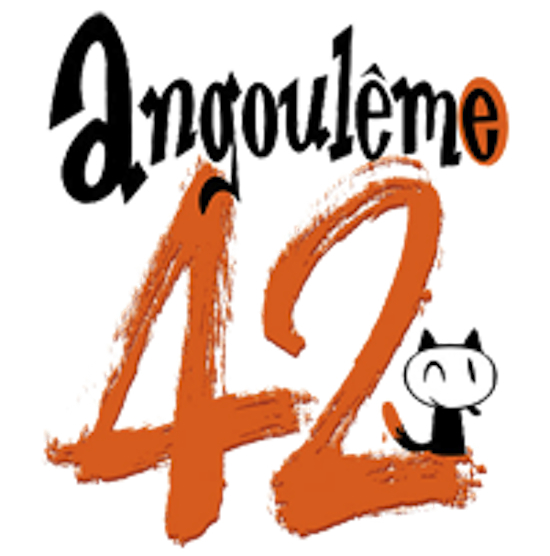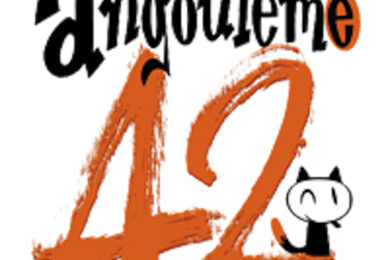There’s a certain magic to Angoulême. I wrote about this last year on my first ever visit to the festival. On returning last week, it took me by surprise (as is magic’s wont) and enveloped me all over again. My trip began with a day and a half in Paris en route. My friend Lara Catrin took me to Cafè Pinson, an excellent gluten-free vegan restaurant. I highly recommend it if you’re ever in Paris and have such eating requirements. It was through Lara’s blog, along with Jeremy Allen’s piece for The Quietus, that I received my initial impressions of the aftermath of Charlie Hebdo. Told by expats living in Paris, it is sources like these that I trust most for such information. Many expressed concern for my going to France at this time, especially to a comics festival, but, despite the palpable presence of armed guards in both Paris and Angoulême, once I arrived I was told that the news reports we’re receiving are greatly exaggerated. Back to Paris for a moment. Did you know that Jodorowsky’s granddaughter Alma is the singer in a pop band? Burning Peacocks. And they’re quite good. I met up with David Baudart, who does the music, at Bar le 17 (a cool little rock n roll joint near Saint-Ambroise, also recommended) Wednesday night to learn more about them and David’s other project, Cabuco. But largely I was on my own in Paris, and starting to miss my friends back in London. When I got to Angoulême the rain was torrential and without much sleep for the past few days, I took a nap that lasted well into evening. Hotels are booked solid for the next year the day after the current festival ends but luckily, should you be looking for lodging, there’s a list of people offering rooms in their homes for a decent price the town’s website. The family I was staying with was extremely nice and it was just a short walk up the hill into the city centre. When I finally made my way in, Angoulême reciprically opened up for me. Familiar faces appeared from seemingly out of nowhere and with the advent of the sun on Friday (which thankfully stayed through Sunday morning) I melted into the city, very glad to be back.
Security was tight, as to be expected. Whereas last year you only needed to show your pass, there were now three checkpoints at the entrance to each exhibit – first a metal detector, next it’s ‘faire un avion’ (‘make an airplane’, i.e. spread out arms and legs) as we were patted down, then finally a ticket check. This greatly slowed down the queues, which grew exponentially greater on the Saturday, making the wait to get into the tents quite a drag. In the end, I could only be bothered to stand in a queue long enough to see the Chinese Comics Exhibit. I was particularly impressed by the works of Yao Feila and Wang Hongli, as well as Luo Yin, whose otherworldly secret police rabbits make me want to read Le Rêve Du Papillon. I mean the first one is called ‘Lapins Sur La Lune’ (Rabbits On The Moon)!
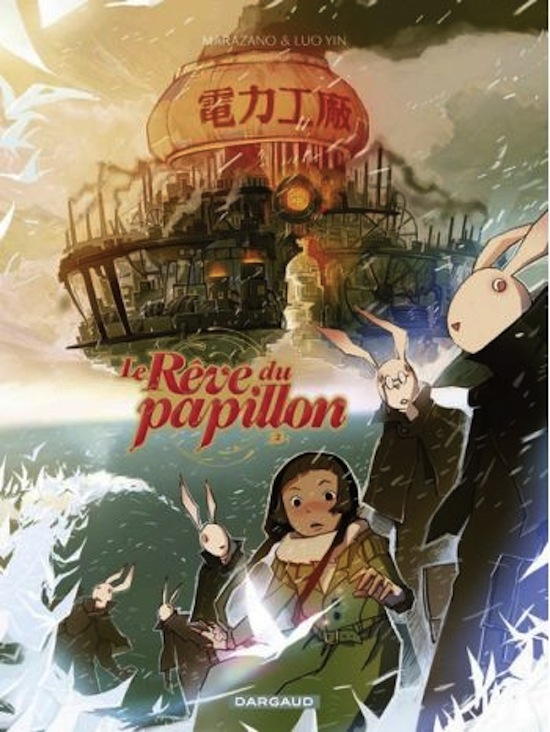
Although what’s on show is worth seeing, the exhibits are only a small part of the Angoulême experience. It’s a place to catch up with friends and make new ones, hit the various parties that seem to spring up out of nowhere, discover new artists and publishers and cop their future plans, check out great books, and chat about all manner of things. Primarily music.
It just so happened on Saturday night that I was in the presence of the world’s two biggest Pere Ubu fans – Dutch artist Typex and Swiss journalist Christian Gasser. After dinner with Gasser, continuing our lengthy musical discussion from last year and learning of his new novel, Rakkaus! (‘Love’ in Finnish), I listened as these two spoke about keeping up with David Thomas’ output, their confusion with Alfred Jarry’s play of the same name when first discovering the band in the 70s, the talk turning to The Velvet Underground, Bowie, and Iggy Pop. Typex told us how he used to draw concert reviews in comic format for a Dutch paper and how he’d love to accompany Iggy Pop on his final tour and document the whole thing as a comic. Let’s hope this happens, it would be amazing. I would spend a good deal of time with this Dutchman over the course of the festival.
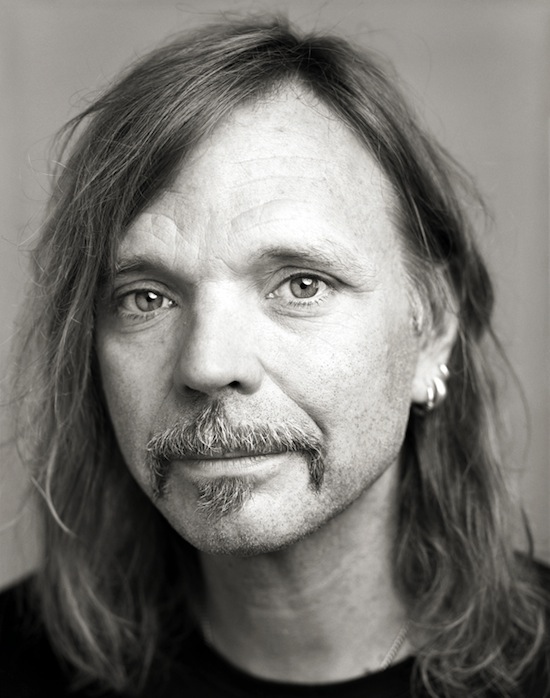
Typex
Typex is a very cool dude. Laidback and friendly, knowledgeable about art and music, and very fond of having a good time. Joost Swarte introduced us at last year’s festival and I ran into him every day afterwards. It was to be the same this time. Taking shelter from a (thankfully brief) cloudburst on Friday, I ducked into the Rights & Licensing Tent and right smack in front of me sitting at the Dutch table was Typex pitching his new book to a German publisher. Excellent as his biography of Rembrandt is (Quietus review here), this new book about Andy Warhol looks like it will even surpass that. I was privy to see some of the preliminary sketches, including this work in progress below, and was greatly impressed by them and his ambitious plans for the art and story. The book is projected to be 500 pages long.
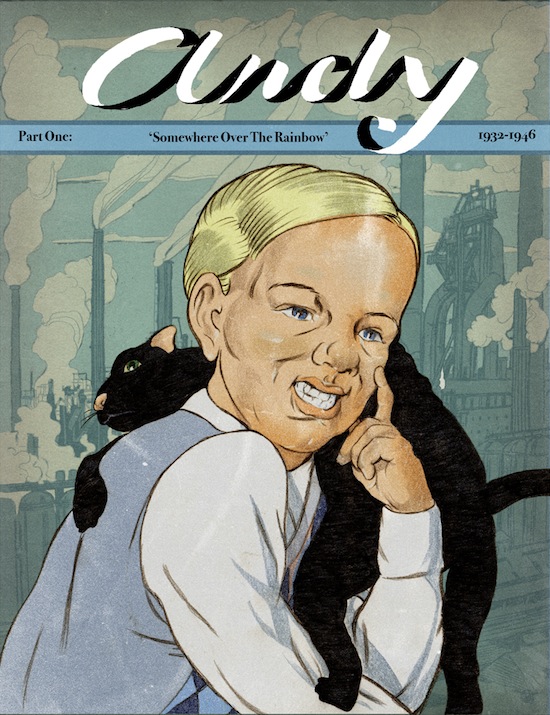
Typex, work in progress
While the French mostly stick to the Hotel Mercure, it is across the square at Le Chat Noir that most everyone else gathers in the evening. Always a pleasure to bump into Joost Swarte there, hearing what new bands he is listening to and about his plans for a new book about 50 cultural icons, the criteria being their importance to him. I was finally introduced to the mighty Hans Joustra, publisher to whom all the Dutch artists I’ve met are intensely loyal. Formerly of Oog & Blik, he has now started Scratch, putting out books by Robert Crumb, Swarte, Typex, Scott McCloud, Craig Thompson, Nicolas de Crécy, Peter Pontiak, and a host of others. And I of course would run into Paul Gravett here as well as multiple times around Angoulême as he flitted across town on his way to various meetings with plans for an upcoming Spanish/Mexican Comics exhibit or a new book on Chinese comics.
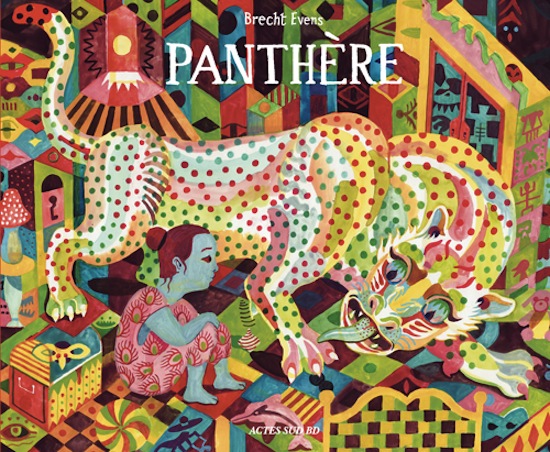
But it was late Saturday night that the mood noticeably turned and whispers went round that Brecht Evens had arrived and was holding court in the cold out front. ‘Brecht Evens is here. I love his work. It’s wonderful.’ I was to hear more than once. I soon found myself sitting outside chatting to a friend at the table where Evens – looking, and acting, very much like a young Nick Cave – was drinking, smoking, and loudly claiming how he would be presented with the Grand Prix the next day (this did not come to pass). ‘Do you know Brecht’s work?’ someone asked me, and Evens inclined his head to hear the answer. ‘I’m afraid I don’t,’ came my reply. Evens sat up straight, took a drag off his cigarette, and proclaimed ‘Well, next year, after you’ve familiarised yourself with my work, I will acknowledge your presence.’ He held in a laugh for a good minute or so. ‘At Angoulême after 10 o’clock, the asshole in me comes out.’ And we agreed to make notes over the course of this coming year for our conversation in Angoulême 2016. When I arrived back at my lodgings quite late, I looked up Brecht, his name nagging a part of my mind that had, contrary to what I had said, come across him before. And indeed, I was somewhat familiar with his work thanks to regular Quietus Comics contributor Reggie Chamberlain-King. Looking at Evens’ blog I was very impressed. His use of colour, his composition of scene, creating magical nighttime fantasy realms that still reek of reality. His new book, Panthère, is now out in French and one hopes an English edition will be available soon.
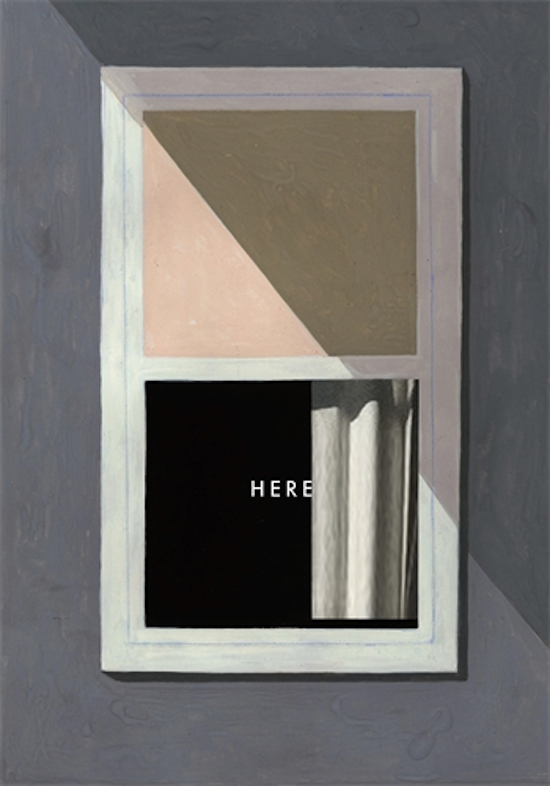
It was Richard McGuire’s Here that was the book on everyone’s lips at Angoulême. ‘Have you seen it? Have you seen it?’ and his presence at the festival caused quite a stir. A Finnish friend even lining up an interview without any plans for the book coming out in Finland. I made sure to pick up a copy. Here is a psychogeographical snapshot spanning billions of years. From the room we first encounter in 2014, turning the pages back into 1957, 1942, jumping to 2007, we soon see the land as it was in 1623 with many more years materializing within and across the pages. Forays some hundreds of years into the future offer a hopeful outlook but not without (perhaps foreseeable) transformative disasters along the way. And the departures into the distant past take us back to the primordial ooze of some three billions years ago. It is a wondrous book detailing a vast territorial memory, paying particular attention to echoes and how they move and carry across generations. McGuire will be in conversation with Dave McKean this Monday evening, February 9th, at the London Review Bookshop in London and doing a signing at Forbidden Planet on the afternoon of the 10th.
I made sure to visit the Centrala stand in the Nouveau Monde tents for their first visit to Angoulême. A Polish publishing house now relocated to London, specialising, but not limited to, Polish comics, they kindly gave me three books. Tomasz Samojlik’s Forest Beekeeper and the Treasure Of Pushcha could be considered a children’s book, yes, but the story goes much deeper. Having conquered the Polish-Lithuanian state, Catherine The Great has given a royal pushcha, part of Bialowieza Primeval Forest, abundant with natural resources, to the unscrupulous General Sobakevich. This villain is hellbent on leveling the land for profit. Inhabitants speak of the legend of The White Beekeeper who protects the pushcha from harm, needed now more than ever. Young Lucy, apprentice to the beekeepers Ignat, is learning the ways of the ancient forest, and both face death if they don’t betray their home to satisfy the general’s greed. A rich Slavic fairytale, with the dark undercurrents familiar to such, Forest Beekeeper does a fine job of capturing the magic of nature, folklore of the area, and a struggle we still see prevalent in the world today. Mateusz Skutnik’s Blacky. Four Of Us I loved. In the Eastern European existential vein – and employing the tradition of the main character having a very one-sided dialogue with an unseen interlocutor – Blacky travels through the mundane, finding solace in some of its activities (washing dishes, ironing shirts), and of course having these thwarted. A nice meditation on time and the important things in one’s life complete with a couple of metafictional intrusions. The washes of grey capture these feelings well as life goes on in this unnamed town. Centrala have also published two large anthologies of silent comics, featuring artists from all over the world.
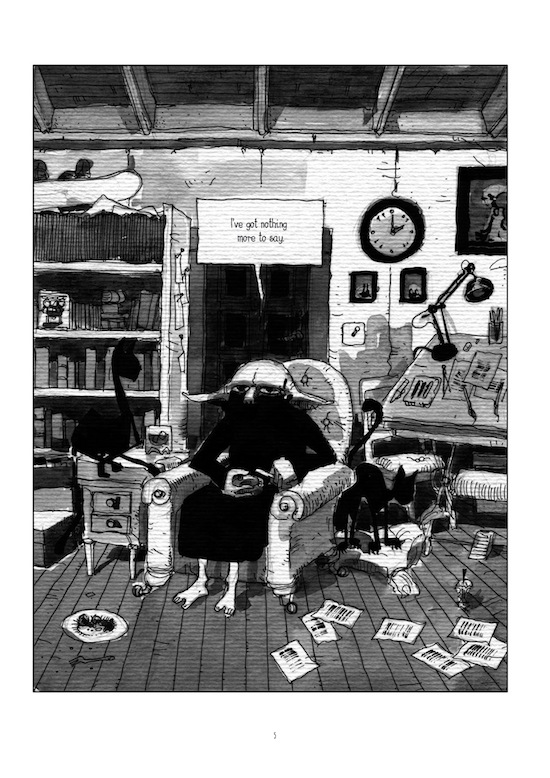
from Mateusz Skutnik’s ‘Blacky. Four Of Us’
The last night of the festival was a late one by all accounts. But the magic of Angoulême continued as I stood on the platform waiting for my 9:43 train and who should stride up on very little sleep but Typex. And so we rode the three hours to Paris together, complete with a ten minute section of what sounded like titans playing ping pong with giant boulders as the train had unknowingly hit a deer. Finally stopping, a conductor thought to grab a large branch from the side of the tracks and poke it out. The conversation continued, discussing the clear line elegance of Yves Chaland, and then Peter Hammill’s career (Typex once saw him do a gig in Holland where the promoter didn’t supply the asked for piano. Hammill improvised a set playing guitar and when he’d run out of guitar songs, performed a cappella). At one point Typex introduced me to the work of Jacovitti, whose Pinocchio is one of his favourites. I’m now on the lookout for a copy of my own.
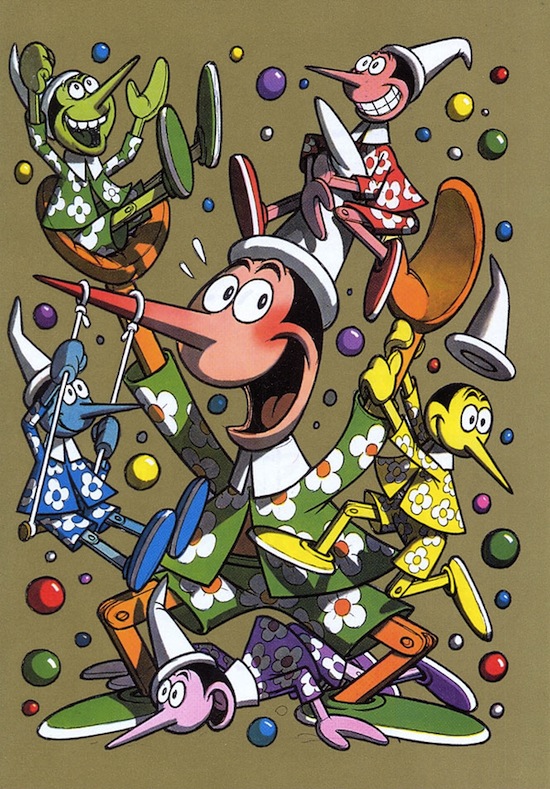
See you in 2016, Angoulême!

